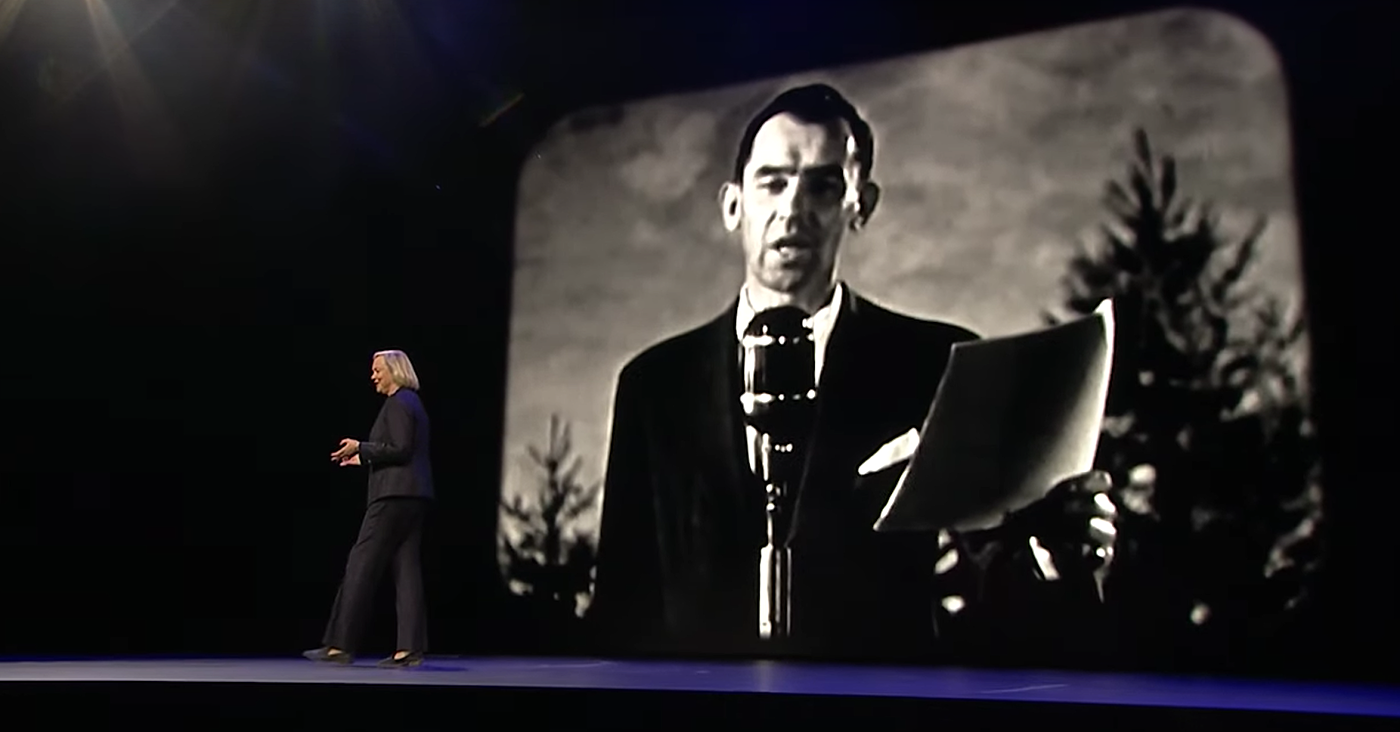
This essay was written and researched by Adam Keesling and Nathan Baschez.
Update: we’re aware Quibi failed! What can we say, we were wrong :) Here’s our post-mortem of the failed prediction.
A couple months ago, at an MGM casino in Las Vegas, Jeffrey Katzenberg marched onstage to fire the opening salvo of Quibi’s CES keynote presentation. The song in his intro video had a familiar melody borrowed from an old gospel song, but with lyrics updated to match the occasion. “You’ve got the whole world in your hands.”
When Katzenberg reached the podium, he pushed up his sleeves and, without any unseriousness or excess excitement, delivered his opening lines:
“What’s the next big opportunity in entertainment? That’s the question I’ve been asking myself pretty much my whole career.”
The crowd leaned forward to hear the answer.
“What you see when you look back at the great technological leaps in entertainment history is that every evolution has been driven by the relationship between creativity and technology. Behind every innovation we see brilliant minds pushing the limits of science to create new entertainment technology, but these new platforms require the creativity of storytellers using their tools in ways that the inventors had never imagined.”
Quibi’s betting that they can supply the creativity needed to unlock the smartphone’s unfulfilled potential as a vehicle for entertainment — and that they’ll build a multi-billion dollar business in the process.
...
Of course, on the face of it, it feels absurd! This is a company that raised nearly $2 billion dollars before launching their product. And why did they raise all this money? To spend it on creating 6-10 minute videos that can be viewed in landscape or portrait on a mobile phone. That’s it. That’s the big innovation.
How will they make money? By charging $5/mo for a version with ads, and $8/mo for a version with no ads. That’s right, they think people will pay to watch Quibi instead of the millions of free, extremely compelling videos on YouTube, Instagram, and TikTok.
So what makes them so confident in their content?
Because it comes from hOLLyWoOD! It has CeLEbRItIEs!
Ok fine, everyone loves TV and movies. But on your phone? In 6-10 minute increments? Unclear.
And let’s keep in mind, Quibi’s content may not represent the best of Hollywood. A couple billion might seem like a ton of money for a tiny startup to spend, but if you compare it to Netflix’s $17 billion content budget for 2020, you can see how it might feel like barely enough. And that’s just Netflix. When you think about Disney, Amazon, NBCUniversal, WarnerMedia (which owns HBO), and Apple, it may become hard to see how Quibi could possibly stand out.
To make matters worse, Quibi’s production process is in shambles, thanks to Covid-19. The US is facing record unemployment, leaving many workers without spare cash to shell out to a non-essential entertainment app. And now that we’re all at home all the time, there may be far fewer “on the go” moments that Quibi is designed for.
At least, that’s the consensus view. But is it true?
...
Some of the biggest wins in business come when a team with specific domain expertise figures out a way to apply their skill to a seemingly unrelated market, in order to create a superior experience.
For example, the iPhone is what you get when a design-centric computer company decides to make a phone. It was revolutionary because Apple had totally different DNA than incumbents like Nokia and Motorola, and this difference put them in a dominant position to make a better product.
Quibi believes they’re doing the same thing. They think their Hollywood DNA gives them unique capabilities that tech companies like Instagram, YouTube, and TikTok can’t compete with.
Here’s how Meg Whitman, Quibi’s CEO, explained it in her section of the CES keynote:
“When we look back at the great leaps forward in entertainment, what we often see is the initial attempts at using a new technology aren’t anything like the ones that last. For example, when television made its debut, creators had no idea how to take full advantage of the new platform. Some early television shows simply featured announcers reading from radio scripts into the camera.”
The question is: who’s the radio announcer here?
Quibi would like you to believe it’s Hollywood, packaging feature length films and TV shows into smartphone apps. But maybe Quibi is the radio announcer. Maybe the old, outdated model is Hollywood itself, and the new, superior, mobile-native model is user generated content.
It’s hard to predict success for any startup, especially one that launched their product literally last night. And we understand that most people reading this are probably skeptics. When we started researching this post, we thought we’d write a list of reasons they were likely to fail. But the more we learned, and the more we thought through the strategy, the more we began to change our minds. We’re now convinced Quibi will succeed.
The Only Subscription
You Need to
Stay at the
Edge of AI
The essential toolkit for those shaping the future
"This might be the best value you
can get from an AI subscription."
- Jay S.
Join 100,000+ leaders, builders, and innovators

Email address
Already have an account? Sign in
What is included in a subscription?
Daily insights from AI pioneers + early access to powerful AI tools










Comments
Don't have an account? Sign up!